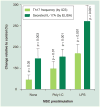Harnessing the therapeutic potential of mesenchymal stem cells in multiple sclerosis
- PMID: 21864075
- PMCID: PMC3234364
- DOI: 10.1586/ern.11.113
Harnessing the therapeutic potential of mesenchymal stem cells in multiple sclerosis
Abstract
Phase I clinical trials exploring the use of autologous mesenchymal stem cell (MSC) therapy for the treatment of multiple sclerosis (MS) have begun in a number of centers across the world. MS is a complex and chronic immune-mediated and neurodegenerative disease influenced by genetic susceptibility and environmental risk factors. The ideal treatment for MS would involve both attenuation of detrimental inflammatory responses, and induction of a degree of tissue protection/regeneration within the CNS. Preclinical studies have demonstrated that both human-derived and murine-derived MSCs are able to improve outcomes in the animal model of MS, experimental autoimmune encephalomyelitis. How MSCs ameliorate experimental autoimmune encephalomyelitis is being intensely investigated. One of the major mechanisms of action of MSC therapy is to inhibit various components of the immune system that contribute to tissue destruction. Emerging evidence now supports the idea that MSCs can access the CNS where they can provide protection against tissue damage, and may facilitate tissue regeneration through the production of growth factors. The prospect of cell-based therapy using MSCs has several advantages, including the relative ease with which they can be extracted from autologous bone marrow or adipose tissue and expanded in vitro to reach the purity and numbers required for transplantation, and the fact that MSC therapy has already been used in other human disease settings, such as graft-versus-host and cardiac disease, with initial reports indicating a good safety profile. This article will focus on the theoretical and practical issues relevant to considerations of MSC therapy in the context of MS.
Figures

References
-
- Bar-Or A, Darlington PJ. The immunology of MS. In: Cohen JA, Rudick RA, editors. MS Therapeutics. 4. Cambridge University Press; Cambridge, UK: 2011. Comprehensive description of the immunological aspects of multiple sclerosis (MS)
-
- Horwitz EM, Le Blanc K, Dominici M, et al. Clarification of the nomenclature for MSC: the International Society for Cellular Therapy position statement. Cytotherapy. 2005;7(5):393–395. - PubMed
-
- Devine SM, Bartholomew AM, Mahmud N, et al. Mesenchymal stem cells are capable of homing to the bone marrow of non-human primates following systemic infusion. Exp Hematol. 2001;29(2):244–255. - PubMed
-
- Flynn A, O’Brien T. Stem cell therapy for cardiac disease. Expert Opin Biol Ther. 2011;11(2):177–187. - PubMed
Publication types
MeSH terms
Grants and funding
LinkOut - more resources
Full Text Sources
Medical
